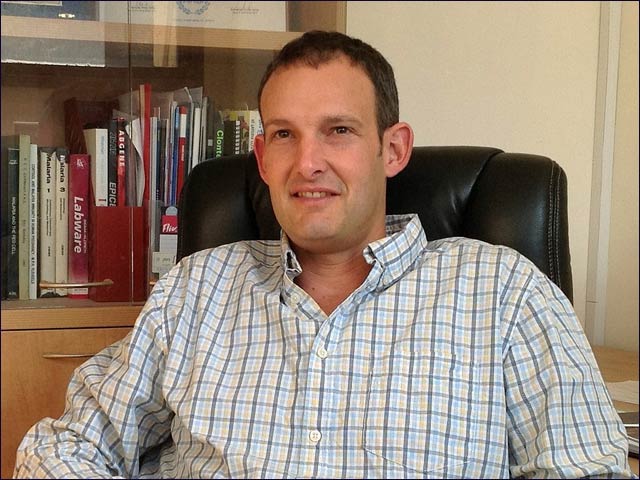By Avigayil Kadesh
Malaria can be caused by any of five deadly Plasmodium parasites carried by Anopheles mosquitoes. The deadliest strain, P. falciparum, responsible for 90 percent of the more than million deaths from malaria each year, knows how to hide its disease-causing proteins from the immune system.
“This is a whole new approach,” explains senior lecturer Ron Dzikowski, who supervised graduate student Inbar Avraham’s project at the Institute for Medical Research Israel-Canada, and the Kuvin Center for the Study of Infectious and Tropical Diseases at the Hebrew University-Hadassah Medical School.
They revealed for the first time the genetic mechanism that enables a parasite to selectively express one protein while hiding other proteins from the immune system.
“Others are looking for drugs or vaccines, but the parasite is always one step ahead of us,” he says. “It quickly develops resistance to drugs and currently there is no effective vaccine. Our approach is to understand how these parasites evade immune attack, and then we can learn how to disrupt this ability.”
The same approach was taken recently by Argentinean researchers studying a wily intestinal parasite, and their findings led to a vaccination that successfully protected lab mice, Dzikowski relates. “So our approach has a reasonable basis.”
Putting a stop to a dangerous ‘game’
The Israeli finding is significant in the worldwide race to find a way to prevent malaria in the most vulnerable populations. This particular parasite most often sickens pregnant women and children under the age of five.
“Malaria causes the death of an African child every half a minute, and the parasite we’re working on is the deadliest form,” says Dzikowski. “If you get malaria from this parasite, your life is seriously endangered.”
It’s not just Africans who are at risk, he adds. “In Israel last year there was a nurse who came back from the Ivory Coast with P. falciparum malaria and she eventually died. So it’s a life-threatening disease even for Westerners who travel to Africa. They are at higher risk because their immune system is naïve.”

Dr. Ron Dzikowski
Photo courtesy of the Hebrew University of Jerusalem
Upon entering the bloodstream, the Plasmodium parasite reproduces in the red blood cells and transports its own proteins to their surface. These cells become sticky and cling to the walls of blood vessels, blocking them and causing damage. The immune system typically identifies these proteins as foreign and creates antibodies to fight the disease.
However, the P. falciparum parasite deceives the immune system by revealing only one of 59 proteins encoded by its DNA. While the immune system is busy fighting that one protein, the parasite switches to another from its arsenal, staying under the radar of the immune system.
In Dzikowski’s lab, which focuses on gene expression in malaria, Avraham identified the parasite’s unique DNA sequence involved in controlling the parasite’s evasion of the immune system. She is continuing to work toward the next logical step – learning how to interfere with the sequence.
“Now that we know how the mechanism works, we must go further to find ways to disrupt it so that the immune system will have an opportunity to overcome the infection,” says Dzikowski. “Inbar is working on this under my guidance.”
He has applied for a renewal of the grant from the Israel Academy of Sciences and Humanities that enabled the initial research. Avraham also had funding from the Einstein Kaye Fellowships, which support outstanding research students.
According to Dr. Dzikowski, "These results are a major breakthrough in understanding the parasite's ability to cause damage. This clever parasite knows how to switch ‘masks’ to evade an immune attack, but our discovery could lead to new ways to prevent it from continuing this dangerous game."